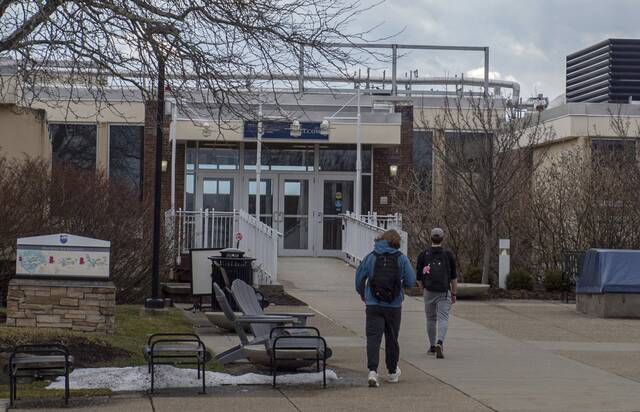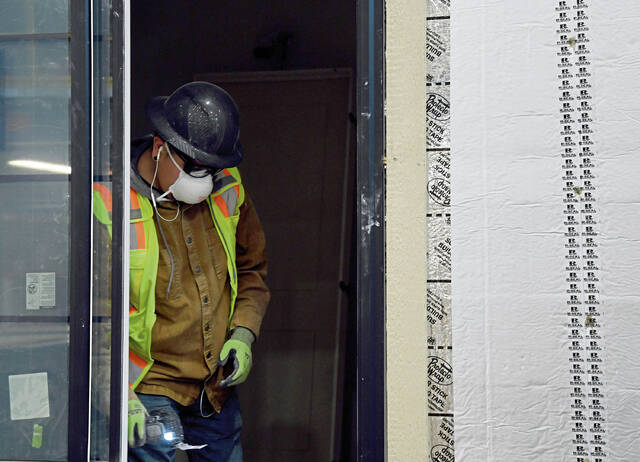There’s a beaver plushie on my nightstand, and a glass bottle of Coke from 1990 in my living room.
What do these two unusual — and one, advisably undrinkable — things have in common? Penn State branch campuses. More importantly, for me, the memories attached to them.
And now that Penn State Beaver and 11 other commonwealth campuses are at risk of being closed, I’m thinking about the opportunities these pockets of blue and white scattered across the state have provided and still provide to so many, opportunities that could be lost if they disappear.
My college education — and with it my 30-plus year career and my life as I’ve known it — began at Penn State Beaver in the fall of 1989. At the end of my two years there, I bought the plushie in the campus bookstore as a keepsake before heading to State College and University Park for my final two years.
The Coke bottle came from a student leadership conference at the Hazleton campus, also on the chopping block, in August 1990. I know that because of the discolored tag that’s still attached to it with a thin blue ribbon. Instead of drinking it as I’m sure was intended, glass Coke bottles were an oddity at the time and it became a souvenir that I’ve somehow managed to hold onto for nearly 35 years.
Yup, I was a “student leader.” While many people who attended the campus, which we called “The Beave,” only wanted to get to University Park as quickly as possible, I was part of that group of students who tried to combat apathy — we used that word a lot — and get our fellow students to enjoy the campus and our time there. I’m not sure how successful we were.
Unlike Penn State New Kensington, Beaver had and still has a dormitory. But I was a commuter student, first driving there from home, then living in “off campus housing,” a fancy term for renting a room in an older couple’s basement near the campus, and then an apartment.
Being at Beaver helped me ease into college from high school and afforded me opportunities I couldn’t have gotten at the main campus, beginning with simply getting in, academically and financially.
Despite graduating high school with good grades, I had not taken enough math and had no foreign language. That, combined with the cost, put University Park out of reach. Beaver admitted me “provisionally,” meaning I’d have to prove myself, or else.
So I took French and the math classes I needed and did not only that but more. I got involved in the radio club, which mainly played music in the student union building, and of course in the monthly student newspaper, The Beaver Herald. Through the advisor, Jack Mitchell, an editor at the Beaver County Times, I became a features correspondent and had my first story appear in a daily newspaper. I was the Herald’s editor my sophomore year, after which an internship at The Times during the summer of 1992 was locked in, giving me the experience and story clips I’d need to land my first job after graduation.
And I’m not entirely sure how it came to be but, after being admitted provisionally, I was accepted into the University Scholars Program, today known as the Schreyer Honors College. That meant I got to take some advanced courses at main campus, reside in Atherton Hall, the honors dorm, in my senior year, and produce an honors project — mine was a newspaper style report on the Pittsburgh Press strike of 1992.
The financial reality of starting at Beaver was just as significant as the academics. Grants and scholarships covered the cost of those first two years. I didn’t need loans until going to University Park, where I lived on campus and had to pay the room and board costs.
So much has changed since my first day at Beaver. The campus isn’t the same. The administration building, a former tuberculosis hospital that was once the only building, was torn down, as was a new modular dormitory being built as I left. Other new buildings and expansions still stand, there are now four-year programs there and the cost has gone up. But, like all the campuses, I’d gather it still offers opportunities close to home just as it did when I was there.
So you can see why the news that “The Beave” and other commonwealth campuses could be closed hits hard. Memories aren’t reason enough to keep something like a college campus open. There are new realities in 2025 that didn’t apply or exist in 1989. But seeing a place that is part of the foundation of my life end would still hurt.
Brian C. Rittmeyer is a TribLive staff writer.








